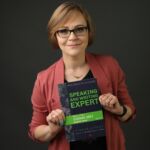HOW TO USE AUTHENTIC MATERIALS
by Małgorzata | Jun 4, 2018 | LEVEL 2, LEVEL 3, LISTENING, ORAL EXAM, READING, SPEAKING, STANAG 6001 EXAMS, VOCABULARY, WRITING, WRITING EXAM, WRITTEN EXAM |

WHY USE AUTHENTIC MATERIALS
Why use authentic materials when preparing for STANAG 6001 exams in English? Or should I rather ask why not use them?
TOO DIFFICULT?
I think that many people believe that authentic articles, films, series, videos or posts are “too difficult” for them. Well, it might seem so, especially at the beginning, but when we think about why we learn and what we want to do in English, it seems only justified to use authentic stuff.
Why?
-
Authentic materials teach authentic language, which is not simplified, adjusted or “smoothed”. This is the language you are likely to encounter when being abroad and talking to people in real life. Authentic materials teach you understand and use natural language.
-
They motivate to learning better. Real thing is more interesting and relevant to us than specially prepared or adjusted content. You may choose whatever content you like, not what the author of a textbook suggested. They are up-to-date and therefore more meaningful to us. They are YOUR choice.
-
STANAG 6001 exams contain authentic texts and recordings, especially, level 3 reading and listening, which consist of authentic materials, mostly unadjusted.
HOW TO USE AUTHENTIC MATERIALS
They can be used both as a source of input, new language as well as the base for its practical usage.
An interesting example of how to do it is presented by the new publication which appeared recently on the Polish market, Newsweek Polska Learning English. The magazine is a selection of articles from the American Newsweek together with interesting exercises and links to additional video and audio materials related to the topic as well as suggestions for practical usage of new language in a group or individually. The magazine is dedicated to people with B2/C1 level of English.
What can you do with authentic materials then?
1. Read the text and chose the key words and phrases.
a. use the key expressions to summarize the problem described in the text (in writing or in speaking)
b. use the words from the text to present your point of view on the topic (in writing or in speaking)
2. On the internet, find a video or audio related to the same topic and while listening, write down the key words and phrases.
a. use the words and phrases to summarize the problem
b. use the words and phrases to present your point of view.
3. Write or record a review and/or recommendation of the article/video. You can share it in social media to get feedback or start a discussion and have authentic conversation about the topic.
4. If you work individually, record your opinions and then listen to them, check if you could correct them.
WHAT ABOUT GRAMMAR?
When your level of language is B2 or C1 you surely already know a lot of grammar theory, so you don’t probably need another grammar textbook. Grammar which naturally appears in texts and recordings will be more useful to you as you will be able to observe how it is used in real language and real contexts.
CAN AUTHENTIC MATERIALS BE USED BY BEGINNERS?
This is the question that is often asked and which I’m asking myself as well. I believe that they can! It seems to me that at the beginning, what we need most is language which is ready to use, not grammatical rules and theory, but authentic expressions useful in real life situations.
Of course, beginners might need some help in selecting appropriate materials,but with the help of even such sites as BBC Learning English or CNN 10 MINUTE NEWS or even YouTube with its subtitles, it might become easier.
What do you think? Can one learn a language without a coursebook?
Like this:
Like Loading...










